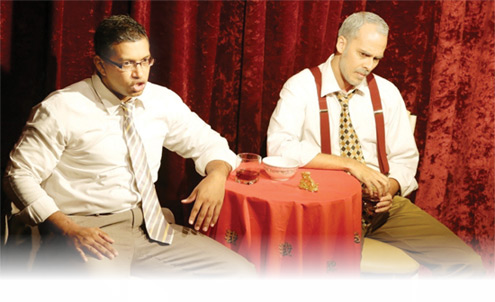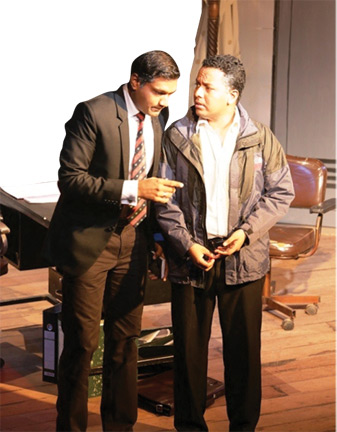|
Glenngarry Glenn Ross:
Sell at any cost or lose it all
By Dilshan Boange
[Part 2]
The production of Glenngarry Glenn Ross presented by Identities Inc.
marked the directorial debut of Gehan Blok. It focuses on certain
aspects of performance and politics of the playwright David Mamet.
Niren Neydorf playing the role of James Lingk the hapless victim of
the slick talking entertainingly engaging Roma was distinctly Sri Lankan
in his diction. There was no sign of any attempted American accentuation
in his phonology which made a rather convincing character of him when it
came to giving life to his emotions of distress and dilemma.
 Although next to Ponweera’s manner of being very persuasively
American as far as the sales talk goes, there was some innocuous
incongruity that got woven to the fabric of the performance. Although next to Ponweera’s manner of being very persuasively
American as far as the sales talk goes, there was some innocuous
incongruity that got woven to the fabric of the performance.
The manner in which Neydorf presented as the keen listener who was
inescapably engaged to be suckered in for a sale when Roma went on his
self indulgent discourse at the Chinese restaurant.
It made Neydorf the kind of player whose manner of expression through
reaction speak soundly of his ability to contribute to the dialogue as
the lesser talking partner he nevertheless plays his part as the ‘barely
verbal’ and effective partner in that interlocution.
American enunciators
Perera, Ponweera and Keller seemed much better positioned in their
roles to claim audience attention and appreciation as well since their
characters afforded greater humour which is crucial when it comes to Sri
Lankan audiences.
Perera must be commended for delivering what is surely a memorable
performance as George Aaranow for whom sympathy would have been evoked
from every person in the audience.
Between Keller and Ponweera the skill and superlative acting talent
that they brought on stage at such junctures as when Levene begins
narrating the way in which he closed a deal, could have kept the
audience’s attention unbroken for hours on end.
The degree of talent for acting shown by these two actors is truly
remarkable. Keller has the ability to devise his acting to be mercurial
in shifting gears to being one who evokes different empathies from a
viewer. The moment when he whittles down to a pile of pathos on the
verge of losing his job pleading for sympathy from Williamson was where
he managed to best craft his expression in terms of gesture and tone to
convince the audience to sympathise with him.
Levene is about to be ‘closed on’. There was barely a laugh that
became audible from the audience when Levene’s pleadings for mercy
became more acute and intense.
After all audiences are more than willing to pounce on the
opportunity to laugh as per Sri Lankan propensities, and a loud mouth
like Levene on whom the tables turn after a round of loud mouthing,
brought to the point of whimpering may be seen as a juncture when an
audience can afford a sardonic laugh.
Yet the response from the audience was testimony to how Keller
managed to convince all of them of the seriousness of his predicament
and exacted the audience’s sympathies on to Levene’s side. There was a
display of praiseworthy talent.
Rajiv Ponweera
“Talkers seduce, words direct us into corners,” says the character of
David Caravaggio in Michael Ondaatje’s novel The English Patient, which
is indisputably true in the case of Richard Roma brought to life by the
extraordinary talents of Rajiv Ponweera. The skill he displayed to drive
forth the performance with an all pervasive stage presence was
astounding. From gestures to language in terms of tone and diction
Ponweera marshalled the right dose of ingredients to change pace and
switch modes as per the junctures in the storyline.
The performance he does in baiting Lingk at the restaurant could have
just as well been a solo monologue act which would nevertheless keep the
viewers convinced that the player knows what he is about and living out
his character on stage. From the moments of laughter he generates
effortlessly out of the audience to the seriousness of his demeanour in
being menacing to the point of venomously castigating Williamson,
Ponweera left no gaps open or steps misplaced in building and sustaining
his performance as one which is capable of presenting many facets of
human behaviour.
In respect of how in moments of waiting wordlessly for his lines,
Ponweera showed reactions to the words being spoken between other
characters evincing that he was very much a character who was attuned to
what was going on in the folds of action on stage.
He did not in any way allow his character to become ‘furniture’ at
any point although the narrative put another in the chair of the
speaker.
His face never did at any point fall fully still when he was waiting
for his turn to deliver his lines. Tacit engagement was evident from his
facial expressions that were discernible for their varying wordless
reactions which were at times somewhat pronounced and also very finely
nuanced without drawing much attention depending on what the moment
called for.
The performance Ponweera delivered spoke soundly of his competence
and skill within him as an able actor which can be summed up in two
words –‘sheer brilliance’.
Given his attributes of physical stature, acting skill and command of
spoken English it is possible that Ponweera has the potential to make it
on the big screen with well-known names in the international industry if
the right opportunities were to come his way in the future.
After all there have been Indian actors such as Naseeruddin Shah and
Art Malik who have marked a presence in the big league film industry of
the Anglophone world.
 Here’s a whole-hearted wish that a Sri Lankan too will make it to
that celebrated level some day, while not forgetting that the much loved
Ranjeet Singh who unforgettably offered “Thousand apologies” on the TV
sitcom of yore, Mind Your Language played by Albert Moses, is a Sri
Lankan. Here’s a whole-hearted wish that a Sri Lankan too will make it to
that celebrated level some day, while not forgetting that the much loved
Ranjeet Singh who unforgettably offered “Thousand apologies” on the TV
sitcom of yore, Mind Your Language played by Albert Moses, is a Sri
Lankan.
Profanities
An aspect to note in the story of Glenngarry Glenn Ross written by
Mamet is the choice of phraseology and the politics represented thereby
when it comes to the choice of derogatory remarks cast on characters to
demean them.
While none of it can be reproduced here for obvious reasons the sheer
profanity in the nature of humiliation sough to be done upon the person
castigated was ripe with gender politics in the context of ‘sexual
orientation’.
Gay bashing remarks were as nearly as constant as strong breeze over
the Galle Face Green! This aspect of the play revealed what was
obviously a window into the American mentality of the male- dominated
testosterone driven world of sales and marketing that declares
masculinity in the form of the aggressive macho maleness to be a
yardstick that measures a man’s worth. Expletive profanities that were
based excessively on derogative terms of reference to male homosexuals
were abundant in the play.
This aspect of the play brings to mind the criticism about American
society and the belief that it is the ‘all American’ image of white
heterosexual patriarchies which ensures the continuance of the American
way of life –capitalism, that was brought out strongly in American
playwright Tennessee Williams’ celebrated play Cat on a hot tin roof.
Perhaps this aspect of the American mindset is what Mamet hoped to hit
on through the insults between men devised in the play.
The actors on stage that evening brought to life the message in that
sense very robustly to the aghast of many in the audience.
An all male affair
Another matter that struck me well after the show was that the story
does not have a single female character. No woman comes on stage during
the performance at any point. The story is, therefore, in an all-male
voice, fully representative of the male psyche. But I never noticed it
during the course of the play.
And it reminded me of what Sinhala fiction writer and dramatist Piyal
Kariyawasam told me once when we were at the Punchi Theatre a couple of
years ago, at a screening of the celebrated black and white Sinhala film
–Haara Laksaya, which is based on the infamous true incident of the
‘turf club robbery’.
The film doesn’t have a single female in the cast of characters who
make up the fabric of the story.
It is very different in that aspect I was told by Piyal when
assessing the elements that generally form the scheme of a Sinhala film.
But the thing is that this fact goes unnoticed until the end.
The total lack of a female character during the entire duration of
the story fails to get registered in the mind of the viewer until the
show is over.
Female presence
In that sense it speaks of the power of the narrative devised by the
director. The same can be said of Glenngary Glenn Ross directed by Gehan
Blok.
It didn’t occur to me until the next morning actually! A female
presence to ‘pepper’ the ‘picture’ isn’t necessary for the sake of it.
Glenngarry Glenn Ross in that sense, symbolically speaking, doesn’t sell
sex.
Sinhala writer and dramatist Udayasiri Wickremaratne once said that
for a work of theatre the greatest accolade and testimony to its
worthiness is when theatregoers say it to be a show that they would
enjoy watching more than once.
Gehan Blok’s directorial debut deserves that accreditation.
It is without a doubt a production I would recommend to theatregoers.
It can be richly applauded as a triumphant arrival for Identities Inc.
Concluded |

